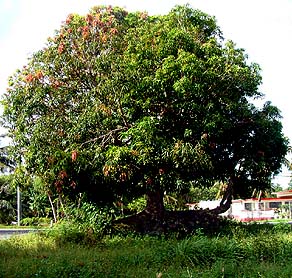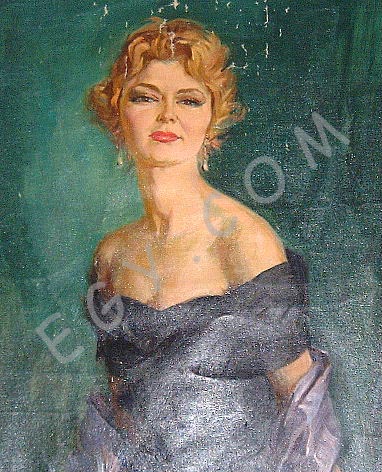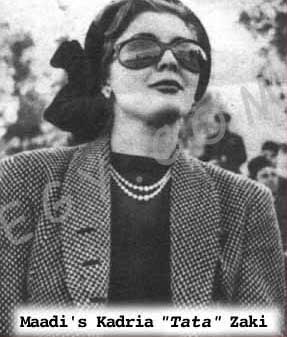by Samir Raafat
EGYPTIAN MAIL, August 6, 1994


portrait of Kadria "Tata" Zaki by Egyptian billiards champion/artist Edmond Soussa
|
|
|
|
|
|
EGY.COM - PERSONALITIES
|
|
by Samir Raafat
EGYPTIAN MAIL, August 6, 1994


portrait of Kadria "Tata" Zaki by Egyptian billiards champion/artist Edmond Soussa
Last week 1940s Egyptian beauty queen Kadria "Tata" Zaki woke up to the sounds of muffled laughter. Strange, it was only 05:45. Peeking from her second floor balcony she saw four white-clad policemen seated around her garden table munching mangoes. In their state of absolute bliss the uniformed men were oblivious to the world. "Sabah al-kheir" she eventually called in what she hoped was a reprimanding voice. "Etfadali" shouted one of the embarrassed soldiers as they quickly retreated towards the garden gate.
This was a typical Maadi summer occurrence, when, at each daybreak, weary soldiers make their way back to the nearby precinct on Road 13 following a thankless 8-hour vigil next to some foreign embassy the name of which they can hardly pronounce. Walking along the emptied Maadi streets the famished conscripts cannot help eyeing the ripe fallen mangoes in this or that garden. The forbidden exotic fruit beckons! At this wee hour when Maadiites are fast asleep lulled by the reassuring whir of their air-conditioners, the young Sai'dis move in for the kill. A delicious banquet awaits them.
Mango season starts at the end of July through August. This is when Maadi's heavily laden mango trees shed their fruit... plunk...plunk...plunk to the delight of owners, gardeners and eager passers-by forever on the lookout. There is hardly a garden that doesn't boast at least one old mango tree.
According to some mangophiles, the first recorded mango tree in Egypt was imported from India in 1832 during the reign of Mohamed Ali Pasha (r. 1805-48). It was planted in his Shubra palace gardens. The most popular local varieties at the time were the Alphonse, the Hindi (Indian) and the Taymour. While the trees look very similar, the size, shape and taste of their respective fruits differ ranging from extra sweet to bitter passing through the heavenly.
While the first generation of mango trees were planted indiscriminately all over Maadi earlier this century, the second and third were most likely the results of mango pips thrown fortuitously in what became someone else's garden.
To Maadi's early settlers most of whom were British and northern Europeans, mangoes epitomized the exotic fruit. This is when mango chutney, mango pies, mango puddings and mango ice cream came into existence. This was also the kind of stuff they wrote about when corresponding with friends and relations who had never seen or tasted a mango. Most Maadi residents took samples back with them on their biannual home leave. In view of the length of the sea voyage the fruit was plucked off the tree still green, wrapped individually in newspapers and stored in large straw baskets.
One Englishman who never failed to bring back mangoes when traveling home was Geoffrey Dale. Like his father before him, Dale was the town's unofficial mayor. Father and son in succession ran the Maadi Delta Company for almost four decades. This was the same company that in 1907 had turned this piece of desert into a lovely green suburb.
Like everyone else in Maadi, Geoffrey regarded mango season with special interest. This is when even the most lazy of Maadi's citizens became an early riser. It had less to do with heat and more to do with palate.
Long before breakfast the seasoned Maadiite was already scouting his garden to uncover what the night had brought in terms of mango harvest. Another reason for waking up early was that if you didn't, the gardener, also an early riser during mango season, would have eagerly cleaned out the lawn. This was an annual ritual that took place each summer. The early riser catches the mango!
"In those days, Maadi's small police station had a Sgt. Abdullah, a bit of a rogue" remembers Dale. "During the season when mangoes filled and ripened, most people who had any mangoes in any quantity kept a strict watch on them."
On rising one morning Dale noticed four Hindi mangoes on the grass. He told his son Michael to go down and collect them and put them in the freezer compartment to cool off so that he could eat one of them for breakfast. When Dale asked Hassan the household help for his mango, the latter claimed he had seen no mangoes. Michael later confirmed he had found no mangoes on the lawn. When after three successive days the same thing happened, Dale realized someone must have been stealing them. So next day he wired up all the gates and waited. Lo and behold, a fellaha girl came at about 06:30 collected some 20 mangoes in the skit of her dress and ran off.
"Before she had gathered all in I was after her. The frightened girl dropped the lot and ran. I only caught her because she had to climb the bottom gate" recalls Dale. It was then that he saw Sgt. Abdullah nearby. "I told him to take her to the police station; he did his best to get me to let her go but I would not, whereupon the girl gave a bit of her mind by saying 'you said you would protect me and now you do nothing'.
It had now become evident that Sgt. Abdullah was in on the game. Determined that the girl would not to this again, Dale dragged her down to George Zaidan, his neighbor on road 83. Gomaa, Zaidan's fearsome gardener opened the garage gate in a very bleary eyed state. When Dale announced he had the mango harami, his eyes opened wide and took hold of her. From that day Dale lost no mangoes and neither did the Zaidans who had complained they were losing theirs.
It later appeared that during mango season Sgt. Abdullah arranged to have a little mango-picker early evening, late at night or early morning. According to Dale, "policemen did not have bicycles in those days, they were proper bobbies and walked."
Despite Peugeot squad cars and Japanese pick-ups replacing the walking-cycling police constables, mango-pickers still abound in Maadi. They will get to the mangoes one way or another, usually by aiming stones at mango trees hoping to bring down the forbidden fruit. But since they are poor marksmen, the stones end up all over your lawn or through your living room window.
As a long-time Maadi resident discovered, the best way of preempting this situation is to sell the mangoes while still on the tree to a local fruit merchant. He will detail someone to guard the trees until harvest time. But this sometimes results in mishaps. A guard while vigilant about his mu'alim's harvest, will unashamedly climb over the fence and pluck the neighbor's mangoes, which is what happened the other day in Ambassador Omar Sirry's garden. He woke up one morning to find his mangoes had disappeared. The culprit meanwhile was happily munching away on the next door lawn.
Mango and other fruit trees have become a hazard. Small wonder garden owners are erecting stone walls around their green perimeter in lieu of the porous green hedges. The overwhelming security detail that surrounds them notwithstanding, the most recent walls to go up in Maadi are these belonging to the Maadi Synagogue and Sidley Manor --the Anglo-Norman villa on Road 13 which has become the South African ambassador's residence. Could it be because both gardens have prolific mango trees?

(also spelt Kadreya Zaki)
with author of article circa 1998
Dear Mr. Raafat,
I have enjoyed reading your many articles and sites on the Jews of Egypt. My father-in-law, Emmanuel Margoliash was born in Maadi in 1920. His father (Wolf) was a dentist there. They arrived in Egypt from Russia via the U.D. Emmanuel just turned 80 and I have been researching his history as sort of a gift to him and his grandchildren (my kids). If you or any one you know remember the family, I'd appreciate your getting in touch. Emmanuel very much liked reading your reminiscences on eating mangoes. I never knew why he liked them so much until now. I'd also like to find out if it is still possible to purchase new or used copies of your book on Maadi. Best wishes.
Shara Kronmal
Reader Comments
Subject: Margoliash family
Date: Tue, 22 Feb 2000 14:47:11 -0600
From: "Kronmal, Shara, M.D."
Chicago, Illinois
|
|